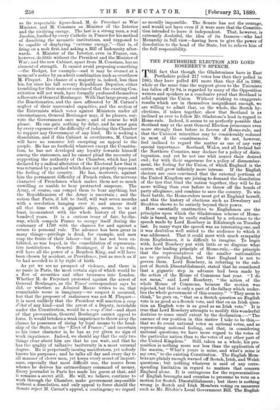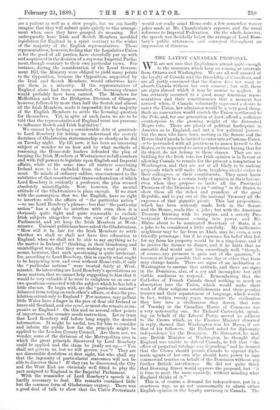THE PERTHSHIRE ELECTION AND LORD ROSEBERY'S SPEECH.
THfact that though the Gladstonians have in East Perthshire polled 217 votes less than they polled in 1885, they have polled 491 more than they did in 1886, while at the same time the support given to the Unionists has fallen off by 94, is regarded by many of the Opposition writers and speakers as a conclusive proof that Scotland is solid against the Union. Without wishing to exaggerate results which are in themselves insignificant enough, we are willing to admit that, on the whole, the Scotch by- elections, if taken together, show that Scotland is as inclined as ever to follow Mr. Gladstone's lead in regard to Home-rule. Indeed, it seems to us perfectly possible that Scotland may at the next General Election pronounce even more strongly than before in favour of Home-rule, and that the Unionist minorities may be considerably reduced in most of the constituencies. We do not, however, feel inclined to regard the matter as one of any very special importance. Scotland, Wales, and all Ireland but the Northern Counties, may declare for a policy of disin- tegration, and yet be not one whit nearer their desired end ; for with their eagerness for a policy of dismember- ment, the feeling for the Union, of which England is the centre, will grow infinitely more intense. If the English electors are once convinced that the external portions of the United. Kingdom are joining to demand the dissolution of the ties that bind the nation together, they will be far more willing than ever before to throw off the bonds of party allegiance, and combine to save the country. To win their battle, the Home-rulers must get at England herself, and this the history of elections such as Dewsbury and Stockton shows to be entirely beyond their power. How essentially unattractive to Englishmen are the principles upon which the Gladstonian scheme of Home- rule is based, may be easily realised by a reference to the speech made by Lord Rosebery in Edinburgh on Tuesday last. In many ways the speech was an interesting one, and it was doubtless well suited to the audience to which it was addressed. That it could meet with much sympathy from Englishmen, it is difficult to imagine. To begin with, Lord Rosebery put with little or no disguise what is now the leading principle of Home-rule,—the principle that the representatives of the smaller nationalities are to govern England, but that England is not to govern them. Lord Rosebery, in referring to the sub- ject of Scotch Disestablishment, stated that he considered that a gigantic step in advance had been made by the action of the House of Commons last year. " I do not mean," said Lord Rosebery, " the action of the whole House of Commons, because the motion was rejected, but that is only a part of the fallacy which under- lies the whole government of this country." " They seem to think," he goes on, " that on a Scotch question an English vote is as good. as a Scotch vote, and that on an Irish ques- tion an English vote is as good as an Irish vote." It is true that Lord Rosebery attempts to modify this wonderful doctrine to some small extent by the declaration :—" The essence of our position in this matter I take to be this,— that we do count national votes as national votes, and as representing national feeling, and that, in considering national questions, we have more regard to the votes of the particular nation than to the votes of any other part of the United Kingdom." Still, taken as a whole, his pro- position is nothing more nor less than the application of the maxim, " What's yours is mine, and what's mine is my own," to the existing Constitution. The English Mem- bers are plainly enough warned off Scotch, Irish, and Welsh questions ; but nothing whatever is said of any corre- sponding limitation in regard to matters that concern England alone. It is outrageous for the representatives of English boroughs and counties to presume to vote on a motion for Scotch Disestablishment; but there is nothing wrong in Scotch and Irish Members voting on measures such as Mr. Ritchie's Local Government Bill. The English are a patient as well as a slow people, but we can hardly imagine that they will submit quite quietly to this arrange- ment when once they have grasped its meaning. Not unfrequently have Irish and Scotch Members moulded legislation for England in a spirit contrary to the wishes of the majority of the English representatives. Those representatives, however, feeling that the Legislative Union is for the good of all parties, have cheerfully put up with and acquiesced in the decision of a supreme Imperial Parlia- ment, though contrary to their own particular views. For instance, during the consideration of the Local Govern- ment Bill, the Ministry were obliged to yield many points to the Opposition, because the Opposition, supported by the Irish and Scotch Members, would otherwise have put them in a minority. If the representatives of England alone had been consulted, the licensing clauses would probably have been carried. The Members for Midlothian and for the Bridgeton Division of Glasgow, however, followed by more than half the Scotch and almost all the Irish Members, made it impossible for the majority of the English Members to settle the licensing question for themselves. Yet, in spite of such facts, we are to be told that the representatives of England must not presume to influence Scotch and Irish legislation !
We cannot help feeling a considerable debt of gratitude to Lord Rosebery for letting us understand the esoteric doctrines of Gladstonian statesmanship so clearly as he did on Tuesday night. Up till now, it has been an unceasing subject of wonder to us how and by what methods of reasoning the Home-rule leaders defended the plan of keeping the Irish Members at Westminster in full numbers and with full powers to legislate upon English and Imperial affairs, while at the same time all matters concerning Ireland were to be excluded from the view of Parlia- ment. To minds of ordinary calibre, unaccustomed to the subtleties of that constitutional transcendentalism of which Lord Rosebery is evidently a professor, the plan seemed absolutely unintelligible. Now, however, the mental attitude of the Gladstonians is plain enough. If we start with the assumption that we, the English, have no right to interfere with the affairs of " the particular nation " —to use Lord Rosebery's phrase—but that " the particular nation" has a right to interfere with ours, then it is obviously quite right and quite reasonable to exclude Irish subjects altogether from the view of the Imperial Parliament, and yet keep the Irish Members at West- minster. Unionist politicians have asked the Gladstonians, " How will it be fair for the Irish Members to settle whether we shall or shall not have free education in England, when we shall not be able to say anything as to the matter in Ireland ?" thinking, in their blundering and unintelligent way, that they were making a real point. It seems, however, that such questioning is quite irrelevant, for, according to Lord Rosebery, this is exactly what ought to be happening now, and even without Home-rule, if only the " particular nations " were treated fairly at West- minster. So interesting are Lord Rosebery's speculations on these matters, that we cannot help suggesting to him that it would be very valuable if he were to enlighten us on one or two questions connected with the subject which he has left a little obscure. To begin with, are the "particular nations" debarred from voting on each other's affairs, or does the pro- hibition extend only to England ? For instance, may gallant little Wales have a finger in the pies of dear old Ireland or brave old Scotland, and vice versa, or must she remain as im- passive as England? On this and on several other points of importance, the country needs instruction. Let us trust that Lord Rosebery will before long supply the desired information. It might be useful, too, for him to consider and inform the public how far the principle might be applied to the London County Council. Are there not, we wonder, some of the divisions of the Metropolitan area in which the great principle discovered by Lord Rosebery could be applied and the claim be justly set up,—" You shall not govern us, but we will govern you"? They are not discernible doubtless at first sight, but who shall say that the ingenuity of particularist statesmen will not be able to discover them ? If they can be discovered, the City and the West End are obviously well fitted to play the part assigned to England in the Imperial Parliament. With the remainder of Lord Rosebery's speech it is hardly necessary to deal. His remarks contained little but the common form of Gladstonian oratory. There was a good deal of talk to show that the Ulster Protestants would not really mind Home-rule, a few somewhat watery jokes made at Mr. Chamberlain's expense, and the usual reference to Imperial Federation. On the whole, however, the speech was decidedly below the average of Lord Rose- bery's public utterances, and conveyed throughout an impression of thinness.



































 Previous page
Previous page